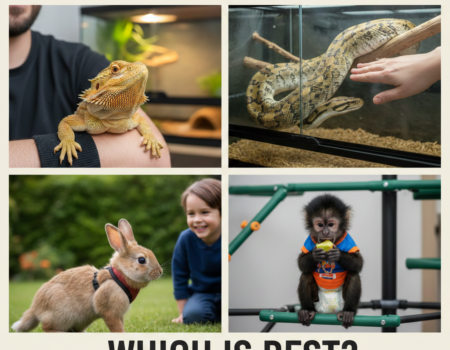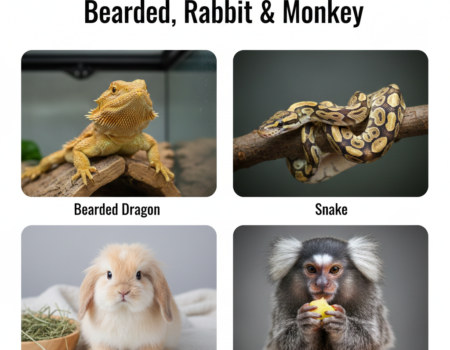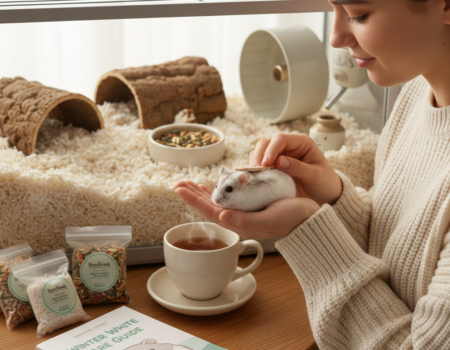If you’re looking to bring a touch of the wild into your living space, why settle for ordinary pets when there are so many unique options out there? We often think of dogs and cats as the go-to choices for companionship, but have you ever considered small exotic pets? These fascinating creatures can add a whole new level of intrigue to your home. So, what are some of the rare and unusual pets that could be your next small and fascinating exotic companion? Let’s dive in and explore!
Key Takeaways:
- Small exotic pets offer a unique and intriguing alternative to traditional pets like cats and dogs.
- Exploring the world of unique pets can bring a sense of adventure and wonder into your life.
- These small exotic pets can be suitable for apartment living, making them accessible to a wide range of lifestyles.
- From rabbits to geckos, there is a small exotic pet out there to suit everyone’s preferences and needs.
- By considering small exotic pets, you can challenge common beliefs about what makes a great companion.
Rabbits
Rabbits make great small exotic pets for apartment living. With approximately 50 different breeds to choose from, there is sure to be a rabbit that fits your preferences. Rabbits are small, quiet, and love to be cuddled. They are also litter trained, making them suitable for indoor living. However, it’s important to bunny-proof your apartment and protect them from chewing on electrical cords.
Why Choose Rabbits as Apartment Pets?
There are several reasons why rabbits are a popular choice for apartment living:
- Rabbits are small in size, making them easy to accommodate in limited living spaces.
- They are relatively quiet pets, minimizing disturbance to neighbors.
- Rabbits enjoy human companionship and love to be cuddled, providing a great source of comfort.
- They can be litter trained, reducing the mess and making them suitable for indoor living.
Tips for Keeping Rabbits in an Apartment
To ensure a happy and safe environment for your rabbit in your apartment, consider the following tips:
- Bunny-proof your space: Rabbits are natural chewers, so it’s important to protect your electrical cords and other potential hazards by covering them or keeping them out of reach.
- Provide adequate space: Although rabbits are small, they still require enough space to move around and stretch their legs. Ensure they have a spacious enclosure or dedicate a rabbit-proofed area for them to explore.
- Offer enrichment: Keep your rabbit mentally stimulated by providing toys, hiding spots, and opportunities for exercise, such as tunnels or obstacle courses.
- Establish a routine: Rabbits thrive on routine, so try to maintain a consistent feeding and play schedule to keep them happy and healthy.
- Regular veterinary care: Make sure to schedule regular check-ups with a rabbit-savvy veterinarian to ensure your pet’s health and well-being.
“Rabbits are delightful apartment pets that can bring joy and companionship to your living space. With their gentle nature and adorable antics, they make a great choice for anyone looking for a small exotic pet that is both cuddly and low-maintenance.”
Ferrets
Ferrets are playful and quiet small exotic pets that are ideal for apartment living. They are low-maintenance pets that spend most of their day sleeping. However, they require a large cage and it’s important to ferret-proof your apartment to prevent them from escaping or hiding in hazardous spots. Some states may require a permit to own a ferret.
If you’re looking for a small exotic pet that will bring joy and entertainment to your apartment, ferrets are an excellent choice. These adorable creatures are known for their playful and mischievous nature, making them great companions for people of all ages. Whether you’re living alone or with a family, ferrets can provide endless entertainment and companionship.
One of the benefits of owning a ferret is their low-maintenance nature. Unlike some other small pets, ferrets are relatively independent and require minimal grooming. They are naturally very clean animals and take care of their own hygiene. This makes them a convenient choice for busy individuals or those who prefer a low-maintenance pet.
“Ferrets are playful and mischievous creatures that bring joy to any household.”
Ferrets are also known for their love of sleep. These cute little critters can sleep up to 16 hours a day! This makes them an excellent choice for apartment living, as they won’t disturb your neighbors with loud noises or excessive activity. However, it’s important to provide them with a comfortable and spacious cage where they can curl up and snooze.
“Ferrets are low-maintenance pets that spend most of their day sleeping.”
When bringing a ferret into your apartment, it’s crucial to ferret-proof the space to ensure their safety. Ferrets are notorious escape artists and can easily squeeze through small gaps or crawl into tight spaces. You’ll need to secure any potential escape routes and remove any hazards that could harm your furry friend.
In some states, owning a ferret may require a permit. Therefore, it’s important to check your local regulations before bringing home one of these playful pets. By doing your research and providing a suitable environment for your ferret, you can enjoy the companionship of these adorable creatures in your apartment.
Mice
Mice make excellent small exotic pets for apartment living. Their small size and minimal space requirements make them well-suited for compact living environments. Additionally, mice are quiet creatures, which is ideal for apartment dwellers who value peace and tranquility.
Mice are relatively low-maintenance pets, making them an attractive option for individuals with busy lifestyles. They have an innate grooming instinct and can keep themselves clean. Regular handling is beneficial as it helps mice overcome their skittish nature and allows for interaction and bonding between pet and owner.
When keeping mice as pets, it is crucial to provide them with a proper enclosure. A mouse cage should have adequate space for them to move around comfortably and engage in natural behaviors. Additionally, the cage should be secure to prevent any escapes and ensure the safety of your furry companions.
Overall, mice are wonderful low-maintenance pets that can bring joy and companionship to apartment owners. Their small size, quiet nature, and minimal care requirements make them an excellent choice for those looking to add a small exotic pet to their home.
Rats
Rats make excellent small exotic pets for apartment dwellers. They are intelligent, friendly, and can be easily tamed. Rats enjoy sitting on their owner’s lap or shoulders, forming a close bond with their human companions. They are most active at night, making them a perfect companion for individuals with nocturnal schedules. Rats are relatively quiet pets, which is ideal for apartment living.
These small creatures don’t require a lot of space. A cage size of about 2 cubic feet per rat is sufficient to keep them comfortable. Ensuring their habitat includes hiding spots and toys will keep them mentally stimulated. Rats are social animals and thrive in pairs or small groups, so consider having at least two rats to keep each other company.
Rats are highly intelligent animals that can be trained to perform tricks and even navigate mazes. Their problem-solving abilities and their curiosity make them fascinating pets to interact with.
If you want to spend time with your rats during the day, it’s important to wake them up as they are most active during the night. Providing them with a balanced and nutritious diet is key to their overall health and well-being. Fresh fruits, vegetables, and high-quality rat pellets should be included in their diet.
Rats are sociable creatures and require regular interaction and mental stimulation. Playtime outside the cage is essential for their mental and physical health. They love exploring new environments, climbing, and even learning new tricks. Just be sure to rat-proof your apartment to prevent any accidental escapes or damage to furniture.
If you’re considering rats as pets, it’s crucial to understand that they have a relatively short lifespan of around 2-3 years. Despite their shorter lifespan, rats can bring joy and companionship to your apartment. They are intelligent, affectionate, and easy to care for, making them an ideal choice for small exotic pets.
Hamsters
If you’re an apartment owner looking for a small exotic pet that won’t take up much space, hamsters are an excellent choice. Not only do they require minimal living space, but they are also relatively quiet, making them perfect for apartment living. Additionally, hamsters are known for being low-allergy pets, making them comfortable for individuals with allergies who still want a furry companion.
One of the advantages of owning a hamster is their cleanliness. They groom themselves regularly, reducing the chances of shedding and allergens in your apartment. This makes them an ideal option for those with sensitivities to pet dander.
“Hamsters are the perfect small exotic pets for people living in apartments. They are compact, quiet, and low-allergy, making them enjoyable companions in a limited space.” – Emily Peterson, Exotic Pet Enthusiast
Another benefit of hamsters as apartment pets is their ease of taming. With regular handling and gentle interactions, they can become quite friendly and comfortable with their owners. Many hamster owners enjoy the bonding experience, as these tiny creatures have unique personalities and can provide endless entertainment.
Providing your hamster with a suitable cage and necessary supplies is crucial for their well-being. They need a cage with proper ventilation, space to exercise, and hiding places for privacy. Including essential items such as a hamster wheel, cozy bedding, and a constant supply of food and water is essential for their physical and mental stimulation.
Hamster Care: Key Points
- Choose a suitable cage with proper ventilation and enough room for your hamster to explore and exercise.
- Provide hiding places, such as tunnels or small igloos, to create a sense of security for your hamster.
- Incorporate a hamster wheel to satisfy their exercise needs and prevent boredom.
- Use appropriate bedding materials, such as aspen wood shavings or paper-based bedding, to ensure comfort and cleanliness.
- Offer a balanced diet comprising of hamster pellets, fresh fruits, vegetables, and occasional treats.
- Regularly clean the cage to maintain a hygienic environment for your hamster’s health.
With proper care, hamsters can live a happy and healthy life within the confines of an apartment. Their small size and low-allergy qualities make them an excellent choice for individuals seeking a small exotic pet that can adapt to limited living spaces.
Comparing Small Exotic Pets Suitable for Apartments
| Pet | Space Requirements | Noise Level | Allergy-Friendly | Tamability |
|---|---|---|---|---|
| Hamsters | Minimal | Quiet | Low-allergy | Easily tamed |
| Rabbits | Requires adequate indoor and outdoor space | Generally quiet, occasional thumping | May cause allergies | Varies by breed, require patience |
| Ferrets | Require a larger cage and play area | Occasional playful noises | May cause allergies | Require socialization and regular handling |
| Mice | Minimal | Quiet | May cause allergies | Skittish, need regular handling |
| Rats | Requires a larger cage | Quiet, more active at night | May cause allergies | Easily tamed with regular handling |
Guinea Pigs
Guinea pigs are small exotic pets that thrive on socialization and are easy to handle. They make great apartment pets due to their friendly and gentle nature, and they don’t typically make loud noises that can disturb neighbors. These adorable creatures only require a moderately sized enclosure to explore and play in.
Guinea pigs enjoy being let out to interact with their owners and explore their environment. It’s important to provide them with a safe and secure space, ensuring the removal of any potential hazards that could harm them. They are social animals and can even be paired up with another guinea pig for companionship.
With their cute appearance and friendly personalities, guinea pigs are perfect for those looking for small exotic pets that bring joy and companionship to their apartment. They are great pets for families with children and can help teach kids about responsibility and empathy.
“Guinea pigs are wonderful pets that can bring so much happiness to your home. They have distinct personalities and love interacting with their owners. Whether it’s gentle cuddles or playful squeaks, guinea pigs are sure to make every day brighter!”
Guinea Pig Care Tips
- Provide a spacious and properly ventilated cage with hiding spots and toys for mental stimulation.
- Make sure to feed guinea pigs a diet rich in fresh vegetables, hay, and specially formulated pellets.
- Regularly clean the cage and change bedding to maintain a clean and odor-free environment.
- Handle guinea pigs gently and frequently to build trust and strengthen the bond.
- Monitor their overall health and schedule regular check-ups with a veterinarian experienced in exotic pet care.
| Pros | Cons |
|---|---|
| Compact size suitable for apartment living | Require a consistent supply of hay and fresh vegetables |
| Gentle and social animals | Need regular floor time for exercise and mental stimulation |
| Low noise levels | May require regular nail trimming |
| Easy to handle and great for families | Require daily attention and social interaction |
Leopard Geckos
Leopard geckos are one of the most popular small exotic pets among lizard enthusiasts. Not only are they fascinating to observe, but they also make great apartment pets. With their friendly nature and beautiful spotted patterns, leopard geckos are sure to add a touch of exotic beauty to your living space.
One of the advantages of owning a leopard gecko is their low maintenance. They can be easily fed with insects like crickets and mealworms, which are readily available at most pet stores. This makes it convenient for apartment dwellers to provide adequate nutrition for their geckos.
Leopard geckos are also known for their sociable nature. They enjoy being handled and interacting with their human owners. This makes them an ideal choice for those looking for a small exotic pet that can provide companionship.
When it comes to housing, leopard geckos don’t require a large tank like some other reptiles. A 20-gallon terrarium is usually sufficient to provide them with enough space to roam and explore. This makes them well-suited for apartment living where space may be limited.
It’s important to note that leopard geckos may carry the bacteria salmonella in their digestive tracts. To prevent the risk of infection, it’s crucial to wash your hands thoroughly after handling them or cleaning their enclosure.
Leopard Gecko Care Guide
| Aspect | Guidelines |
|---|---|
| Housing | – 20-gallon terrarium – Secure lid with proper ventilation – Provide hiding spots |
| Temperature | – Basking spot: 88-92°F (31-33°C) – Cool side: 75-80°F (24-27°C) – Use heat sources like ceramic heat emitters or heating pads |
| Lighting | – Provide a UVB light source for vitamin D synthesis – Use a timer for a consistent light cycle |
| Diet | – Feed live insects (e.g., crickets, mealworms) – Dust insects with calcium and multivitamin supplements – Provide fresh water |
| Handling | – Approach gently and avoid sudden movements – Support the gecko’s body – Avoid restraining the tail |
| Healthcare | – Regularly clean the enclosure – Monitor for signs of illness (e.g., loss of appetite, lethargy) – Consult a reptile veterinarian for check-ups |
Bearded Dragons
Bearded dragons are docile and friendly small exotic pets, making them suitable for beginners. They are easy to keep and can comfortably live in an apartment. Although they require an adequately sized habitat, they don’t grow very big. Bearded dragons are legal to own in most states, including New Jersey. However, proper handwashing to avoid salmonella transmission and providing a varied diet are important aspects of their care.
| Attributes | Care Needs |
|---|---|
| Temperament | Docile and friendly |
| Size | Can grow up to 24 inches |
| Habitat | Adequately sized enclosure with heat and UV lighting |
| Feeding | Varied diet of insects and vegetables |
| Legal Requirements | Legal to own in most states, including New Jersey |
Hedgehogs
Hedgehogs make excellent small exotic pets for apartment living. They are quiet and well-suited for people with allergies, as they produce very little dander. Hedgehogs are generally solitary and gentle in nature, making them easy to handle and care for.
When considering a hedgehog as a pet, it’s important to provide them with a suitable cage size and create an environment where they can display their natural behaviors. Hedgehogs are omnivores and enjoy a varied diet of insects, fruits, and vegetables. Regular cleaning of their cage is necessary to maintain their hygiene.
Hedgehogs are nocturnal pets, which means they are most active during the night. If you’re a night owl, they can be the perfect companions for you, as you’ll have plenty of opportunities to interact and observe their behaviors.
Pros and Cons of Owning Hedgehogs
| Pros | Cons |
|---|---|
| Quiet and low-dander pets | Owning may require a permit in certain states |
| Easy to handle and care for | Require a suitable cage size and environment |
| Nocturnal and active during the night | Special dietary needs and regular cage cleaning |
Owning a hedgehog can be a unique and rewarding experience, but it’s essential to check your local regulations regarding ownership and permits. By providing a suitable living environment and meeting their specific needs, hedgehogs can thrive as apartment pets and bring joy to your life.
Frogs
Frogs can make wonderful small exotic pets for those living in small apartments who enjoy observing their pets. These amphibians require minimal space and are low maintenance, making them ideal for apartment living. Unlike other pets that need constant attention, frogs only need to be fed a few times a week, making them a convenient option for individuals with busy schedules.
However, it’s important to do your research and understand the specific needs of the type of pet frog you want to own. Different frog species have varying care requirements, including specific temperature, humidity, and diet needs. By providing the right environment and conditions, you can ensure the health and well-being of your pet frog.
Some male frogs may sing as part of their natural behavior, but their croaking is usually not loud enough to disturb neighbors in an apartment setting. In fact, the gentle sounds of frogs can create a soothing ambiance, adding to the peaceful atmosphere of your home. So, if you’re looking for a unique and low-maintenance pet that can bring a touch of nature to your apartment, consider adding a frog to your family.
FAQ
What are some unique small exotic pets suitable for living in an apartment?
There are several unique small exotic pets that can thrive in an apartment setting. Some popular options include rabbits, ferrets, mice, rats, hamsters, guinea pigs, leopard geckos, bearded dragons, hedgehogs, and frogs.
What are the characteristics and care requirements of rabbits as small exotic pets?
Rabbits are small, quiet, and love to be cuddled. They can be litter trained and are suitable for indoor living. However, it’s important to bunny-proof the apartment and protect them from chewing on electrical cords.
What are the characteristics and care requirements of ferrets as small exotic pets?
Ferrets are playful and quiet pets that spend most of their day sleeping. They require a large cage and the apartment should be ferret-proofed to prevent escapes or hiding in hazardous spots. Some states may require a permit to own a ferret.
What are the characteristics and care requirements of mice as small exotic pets?
Mice are small, quiet, and fairly easy to take care of. They can groom themselves and are suitable for apartment living due to their small size and minimal space requirements. Providing them with a proper enclosure is important.
What are the characteristics and care requirements of rats as small exotic pets?
Rats are intelligent, friendly, and quiet pets that can be easily tamed. They enjoy sitting on their owner’s lap or shoulders and are most active at night. With a suitable cage size, they don’t require a lot of space.
What are the characteristics and care requirements of hamsters as small exotic pets?
Hamsters are low-maintenance pets that don’t require a lot of space and are relatively quiet. They are clean and don’t shed much, which makes them comfortable for people with allergies. Hamsters can be easily tamed with regular handling.
What are the characteristics and care requirements of guinea pigs as small exotic pets?
Guinea pigs are small exotic pets that thrive on socialization and are easy to handle. They typically don’t make loud noises and only require an enclosure of a certain size. Allowing them to interact with their owners is important, but potential hazards should be removed.
What are the characteristics and care requirements of leopard geckos as small exotic pets?
Leopard geckos are popular small exotic pets among lizard owners. They have a friendly nature and can be easily fed with insects. They enjoy being handled and don’t require a large tank, making them suitable for apartment living.
What are the characteristics and care requirements of bearded dragons as small exotic pets?
Bearded dragons are docile and friendly small exotic pets, making them suitable for beginners. They are easy to keep and can comfortably live in an apartment. They require an adequately sized habitat and proper handwashing to avoid salmonella transmission.
What are the characteristics and care requirements of hedgehogs as small exotic pets?
Hedgehogs are quiet and good for people with allergies as they don’t produce much dander. They are generally solitary and gentle in nature. Hedgehogs require a suitable cage size and may require a permit in certain states.
What are the characteristics and care requirements of frogs as small exotic pets?
Frogs can be great small exotic pets for people with small apartments who enjoy observing them. They require minimal space and are low maintenance, only needing to be fed a few times a week. However, research on specific care requirements is crucial.










No Comment! Be the first one.